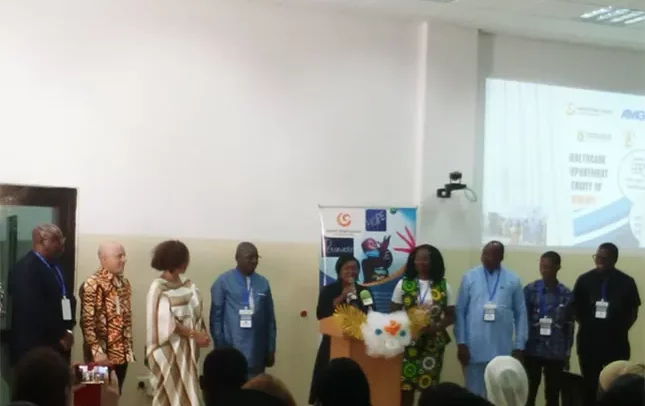Stakeholders in a group photograph at the launch
The University of Ghana, Legon, in collaboration with World Child Cancer, launched the Master of Science (MSc) Healthcare Play Therapy Programme in Accra on June 11, 2025.
The programme is in alignment with the UN Sustainable Development Goal (SDG) three and the World Health Organisation’s (WHO) call for people-centred healthcare. This programme is designed to equip healthcare professionals with specialised therapeutic “play skills” required to support children dealing with the trauma of diagnosis and the treatment of chronic diseases.
President of the Childhood Cancer Society, Professor Lorna Awo Renner, explained that even as adults, doctor visits are often a daunting experience, and for children, the experience is even more so. She noted that the mental health of children undergoing treatment is often neglected in the wake of their illness, but expressed hope that this programme would help to transform the country’s health sector by ensuring that the mental well-being of children dealing with chronic ailments is deliberately considered.
“Even as adults, when you’re told it’s time to go to the hospital to have a check-up, how many of you don’t start getting heart palpitations? What’s more, a child, whose world is all about play, should be about play.
“Just imagine, have you thought that children going to the hospital, whatever going on, could affect their mental health. Who knows what long-term effects it could have on them? And so we have to remember that even when children are going to school, they start with play, what more when they go into unfamiliar and quiet, intimidating environments as the hospital. We forget to ask children’s permission, so I’m sure this is really going to transform our healthcare practices in Ghana and become a more child-friendly health service,” she said.
A representative of the Ghana Health Service (GHS), Dr. Hafis Adams, commended key stakeholders for the creation of the programme, and noted that it would be bridging a gap in the healthcare system by emphasising mental health, emotional resilience and coping strategies, thus reducing anxiety, fear and emotional distress of children, thereby enhancing communication between young patients, their healthcare providers and care givers.
“I wish to commend the University of Ghana, the University of Health and Allied Sciences, World Child Cancer and all key stakeholders for this pioneering programme, which addresses a vital gap in Ghana’s healthcare system by emphasising mental health, emotional resilience and coping strategies. This programme has a greater potential of reducing fear, anxiety and emotional distress among children while enhancing communication between young patients, their caregivers and healthcare professionals,” he explained.
He also added that the programme aligns with the goals of three key objectives of the Ministry of Health, namely the integration of mental health and psychological support across all levels, the development of a skilled and child-sensitive workforce, and the promotion of people-centred care.
By Vera Owusu Sarpong


